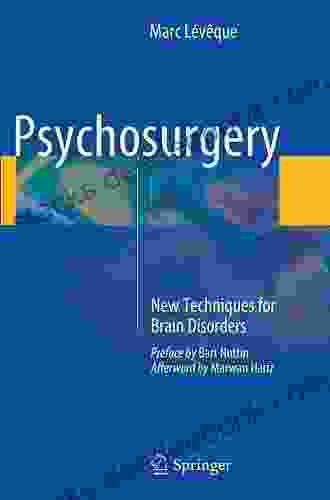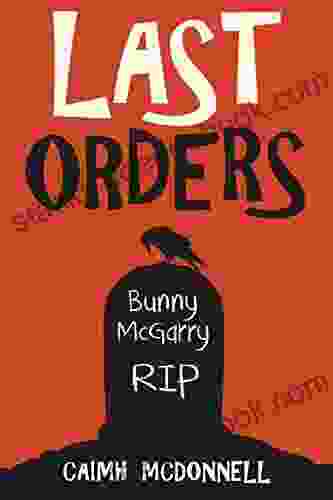Psychosurgery: New Techniques for Brain Disorders

Psychosurgery is a surgical procedure that involves the removal or alteration of brain tissue to treat mental disorders. Once a controversial and experimental procedure, psychosurgery is now a recognized and effective treatment for certain brain disorders.
In recent years, there have been significant advances in psychosurgical techniques. These new techniques are less invasive and more precise than traditional psychosurgery, and they offer the potential for improved outcomes for patients.
This article will explore the latest techniques in psychosurgery and their potential to help people with mental illness.
5 out of 5
| Language | : | English |
| File size | : | 5832 KB |
| Text-to-Speech | : | Enabled |
| Screen Reader | : | Supported |
| Enhanced typesetting | : | Enabled |
| Print length | : | 378 pages |
There are two main types of psychosurgery:
- Ablative psychosurgery involves the removal or destruction of brain tissue.
- Modulatory psychosurgery involves the alteration of brain tissue without destroying it.
Ablative psychosurgery is the older and more traditional type of psychosurgery. It is typically used to treat severe and treatment-resistant mental disorders, such as obsessive-compulsive disorder (OCD) and schizophrenia.
Modulatory psychosurgery is a newer type of psychosurgery that is less invasive and more precise than ablative psychosurgery. It is typically used to treat less severe mental disorders, such as depression and anxiety.
In recent years, there have been significant advances in psychosurgical techniques. These new techniques include:
- Deep brain stimulation (DBS) involves the implantation of a small electrode into the brain. The electrode is connected to a pacemaker-like device that sends electrical impulses to the brain. DBS has been shown to be effective in treating a variety of brain disorders, including Parkinson's disease, Alzheimer's disease, and OCD.
- Vagus nerve stimulation (VNS) involves the implantation of a small electrode into the vagus nerve. The vagus nerve is a long nerve that runs from the brain to the abdomen. VNS has been shown to be effective in treating depression and epilepsy.
- Transcranial magnetic stimulation (TMS) involves the use of magnetic pulses to stimulate the brain. TMS is a non-invasive procedure that can be used to treat depression, anxiety, and other mental disorders.
These new techniques in psychosurgery are less invasive and more precise than traditional psychosurgery. They offer the potential for improved outcomes for patients, and they could help to make psychosurgery a more widely accepted treatment for mental disorders.
Psychosurgery can offer a number of potential benefits for people with mental disorders. These benefits include:
- Relief from severe and treatment-resistant symptoms Psychosurgery can provide relief from severe and treatment-resistant symptoms that have not responded to other treatments.
- Improved quality of life Psychosurgery can help people to improve their quality of life by reducing their symptoms and improving their functioning.
- Increased independence Psychosurgery can help people to become more independent by reducing their need for medication and other treatments.
Psychosurgery is a serious surgical procedure, and it carries some risks and complications. These risks include:
- Bleeding
- Infection
- Seizures
- Neurological damage
- Death
The risks of psychosurgery vary depending on the type of procedure being performed. For example, the risks of DBS are lower than the risks of ablative psychosurgery.
It is important to discuss the risks and complications of psychosurgery with your doctor before deciding whether or not to undergo the procedure.
Psychosurgery is not a suitable treatment for everyone with a mental disorder. The best candidates for psychosurgery are people who have severe and treatment-resistant symptoms that have not responded to other treatments.
Psychosurgery is also typically not recommended for people who have a history of violence or aggression, or who are at high risk for suicide.
Psychosurgery is a controversial and experimental procedure, but it can be an effective treatment for certain brain disorders. The latest techniques in psychosurgery are less invasive and more precise than traditional psychosurgery, and they offer the potential for improved outcomes for patients.
If you are struggling with a severe and treatment-resistant mental disorder, you may want to consider talking to your doctor about psychosurgery.
5 out of 5
| Language | : | English |
| File size | : | 5832 KB |
| Text-to-Speech | : | Enabled |
| Screen Reader | : | Supported |
| Enhanced typesetting | : | Enabled |
| Print length | : | 378 pages |
Do you want to contribute by writing guest posts on this blog?
Please contact us and send us a resume of previous articles that you have written.
 Chapter
Chapter Text
Text Story
Story Reader
Reader E-book
E-book Magazine
Magazine Paragraph
Paragraph Sentence
Sentence Bookmark
Bookmark Shelf
Shelf Glossary
Glossary Annotation
Annotation Manuscript
Manuscript Scroll
Scroll Classics
Classics Library card
Library card Reference
Reference Encyclopedia
Encyclopedia Dictionary
Dictionary Thesaurus
Thesaurus Character
Character Resolution
Resolution Catalog
Catalog Card Catalog
Card Catalog Borrowing
Borrowing Stacks
Stacks Periodicals
Periodicals Study
Study Scholarly
Scholarly Journals
Journals Rare Books
Rare Books Special Collections
Special Collections Interlibrary
Interlibrary Literacy
Literacy Dissertation
Dissertation Storytelling
Storytelling Awards
Awards Reading List
Reading List Book Club
Book Club Textbooks
Textbooks Webb Garrison
Webb Garrison Steven Casey
Steven Casey Bernard E Harcourt
Bernard E Harcourt Eden Crowne
Eden Crowne P R Kumaraswamy
P R Kumaraswamy Graham Norton
Graham Norton Al Yankovic
Al Yankovic Toshio Mori
Toshio Mori Marques Lewis
Marques Lewis Mg Martin
Mg Martin Adrian Tchaikovsky
Adrian Tchaikovsky Joseph Crosby Lincoln
Joseph Crosby Lincoln Donna Douglas
Donna Douglas Barbara O Connor
Barbara O Connor Nick Russell
Nick Russell Michael J Shapiro
Michael J Shapiro Charlene Phillips
Charlene Phillips Tom Zalaski
Tom Zalaski Erich Segal
Erich Segal Emilio J Becker
Emilio J Becker
Light bulbAdvertise smarter! Our strategic ad space ensures maximum exposure. Reserve your spot today!

 Stephen FosterExploring the Hidden Gems of Japan: A Comprehensive Guide for Tourists from...
Stephen FosterExploring the Hidden Gems of Japan: A Comprehensive Guide for Tourists from...
 Fernando PessoaArden Shakespeare Third Series: Unveiling the Rich Tapestry of Shakespeare's...
Fernando PessoaArden Shakespeare Third Series: Unveiling the Rich Tapestry of Shakespeare's... Mark MitchellFollow ·15k
Mark MitchellFollow ·15k Leo TolstoyFollow ·12.3k
Leo TolstoyFollow ·12.3k Anthony WellsFollow ·14.4k
Anthony WellsFollow ·14.4k Jamal BlairFollow ·4k
Jamal BlairFollow ·4k Luke BlairFollow ·4.7k
Luke BlairFollow ·4.7k Eli BlairFollow ·2.1k
Eli BlairFollow ·2.1k Stan WardFollow ·16.5k
Stan WardFollow ·16.5k Edwin CoxFollow ·19.8k
Edwin CoxFollow ·19.8k

 Amir Simmons
Amir SimmonsMore Zeal Than Discretion: A Closer Look at the Risks and...
Enthusiasm is often seen as a positive...

 Wayne Carter
Wayne CarterYear of the Dog: American Poets Continuum 178
Year of the Dog is a...

 David Foster Wallace
David Foster WallaceThe Constitution of the State of New York: A...
The Constitution of the...

 Harvey Bell
Harvey BellSmall Cetaceans of Japan: Exploitation and Biology
Small cetaceans, including...

 Blake Bell
Blake BellEffortless Elegance: A Comprehensive Guide to Captivating...
In the realm of crocheting,...
5 out of 5
| Language | : | English |
| File size | : | 5832 KB |
| Text-to-Speech | : | Enabled |
| Screen Reader | : | Supported |
| Enhanced typesetting | : | Enabled |
| Print length | : | 378 pages |










